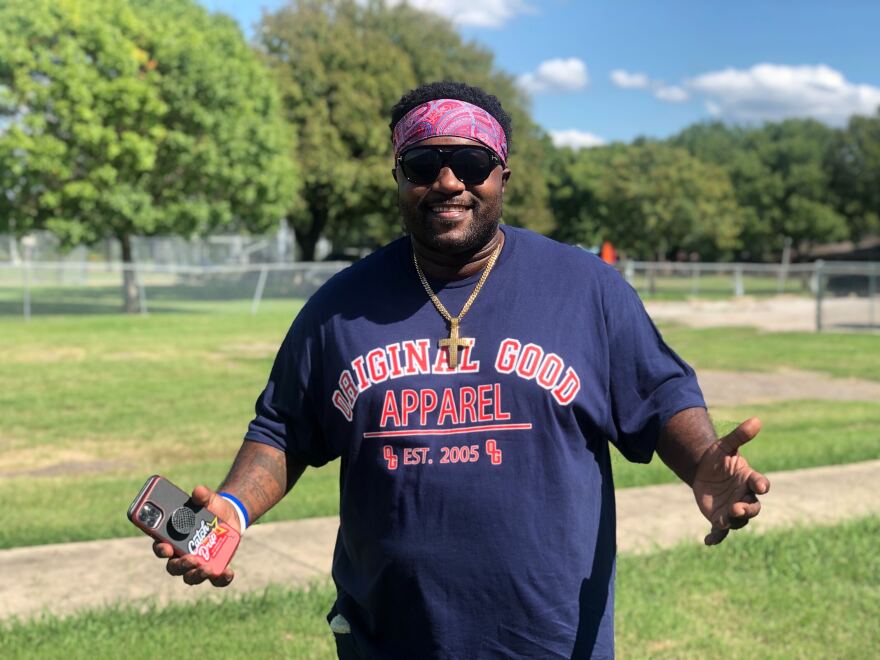When Dallas resident Marcus Estelle was 18 years old, he was sentenced to 255 years in prison for aggravated robbery.
“You know, I got spanked! And I take that responsibility,” Estelle, who’s now 46, said.
Estelle, who goes by Big Milk, grew up in the neighborhood of Pleasant Grove and was formerly in a Bloods gang called Teenage Mob. For that arrest he ended up serving 13 years in prison, and said that experience served as an "awakening."
“The same streets that I helped destroy, I gotta build. So that very thing that caused my demise has caused my arise,” Estelle said.
Now, he’s a member of Urban Specialists, a group of former gang members that’s joining forces with the City of Dallas as part of a new "Violence Interrupters" program that’s focused on ending violence.
Police statistics show violent crime has increased in the city of Dallas this year. At a city Public Safety Committee meeting on Monday, city leaders theorize that the uptick in recent months might be related to stress from the COVID-19 or financial problems.
“The same streets that I helped destroy, I gotta build. So that very thing that caused my demise has caused my arise."Marcus Estelle, volunteer with Urban Specialists
According to the Dallas Morning News, Dallas police have reported 162 homicides this year, which is 12 more than at this time a year ago.
City leaders are looking for solutions to reduce it. Violence Interrupters is one of several recommendations made in January 2020 by the Mayor’s Task Force on Safe Communities.
The proposed budget by the city manager states this program will “establish violence interrupters — credible individuals who serve as mentors and conflict resolution experts to curb violence from within their neighborhoods...as part of the City’s Reimagining Public Safety effort.” It would cost $750,000.
One question now is: Will the city vote to fund and launch it in January 2021?
“From an economic standpoint one shooting could cost upward of a million dollars. Now from a financial standpoint you can run one of these programs with about 12 members for about $500,000,” Dr. Howard Henderson, Founding Director of the Center for Justice Research at Texas Southern University in Houston said.
The men and women who are part of Urban Specialists are volunteers who have taken the matter of stopping violence into their own hands. They're focusing on community-driven solutions and deepening connections in their neighborhoods, typically ones with the highest crime rates in the city, to reduce violence and crime.
Similar programs have been implemented in cities like Chicago, New York and Washington D.C.
“If you talk to the program developers, they'll tell you they see significant reductions in homicide rates and decline shootings,” Henderson said. “In Chicago they found a 31% reduction in homicide and 19% reduction in shootings."
Violence Interrupter programs have proven effective in reducing crime. The Chicago program, Cure Violence, has been evaluated several times. A study released in 2014 found that homicides decreased by more than 30% and in two Chicago districts where the group worked, and there was a 19% decline in shootings.
Bishop Omar Jahwar founded the nonprofit Urban Specialists more than 20 years ago. Members or so-called "violence interrupters" call themselves OGUs, which stands for Original Gangsters United. They're trained to identify conflict and intervene, while earning trust from residents.
“What we call it is you have to learn how to create a pause,” Jahwar said. “Folks who don’t believe they have an out, you go into survival mode. Well, what you got to have are individuals who can go to areas where that have those elements at play and become interpreters.”

According to Jahwar, the organization has graduated more than 400 ex-gang members. He said an important part of the program is to build relationships with the community.
“You need to know the zip code — intimate knowledge of the community, the rules, the streets, people,” said Jahwar.
On Saturday, the organization hosted a block party in a neighborhood in Oak Cliff, which residents refer to as “Best for Less” because there used to be a store of the same name in the neighborhood. Fumes from a grill filled the air as residents cooked some BBQ, brisket, chicken legs and hot dogs while listening to '90s hip-hop. OGUs were there talking to people about their goal to “decrease the rate of senseless violent crime.”
“There’s a saying that says, ‘You fight and shoot each other when you drink together, but when you eat together you break bread and you become a family,’” OGU Antong Lucky said. “I want young people over here to know that their zip code don’t determine their altitude.”
This community event and other efforts like neighborhood walks, clean-ups, and food distribution are part of a 90-day tryout with the city that focuses on three high-risk neighborhoods: Pleasant Grove, South Dallas and Oak Cliff.
“You need to know the zip code -- intimate knowledge of the community, the rules, the streets, people."Antong Lucky, volunteer with Urban Specialists
The test run is being funded by AT&T and the Mark Cuban Foundation. Urban Specialists relies on donations and they're hoping to get buy-in from city leaders.
“It’s important for organizations or investors or the city to invest in their people. You want to change this neighborhood? You have to hire the people that has influence in these neighborhoods,” said Estelle.

Got a tip? Alejandra Martinez is a Report For America corps member and writes about the economic impact of COVID-19 on marginalized communities for KERA News. Email Alejandra at amartinez@kera.org. You can follow Alejandra on Twitter @_martinez_ale.
KERA News is made possible through the generosity of our members. If you find this reporting valuable, consider making a tax-deductible gift today. Thank you.






